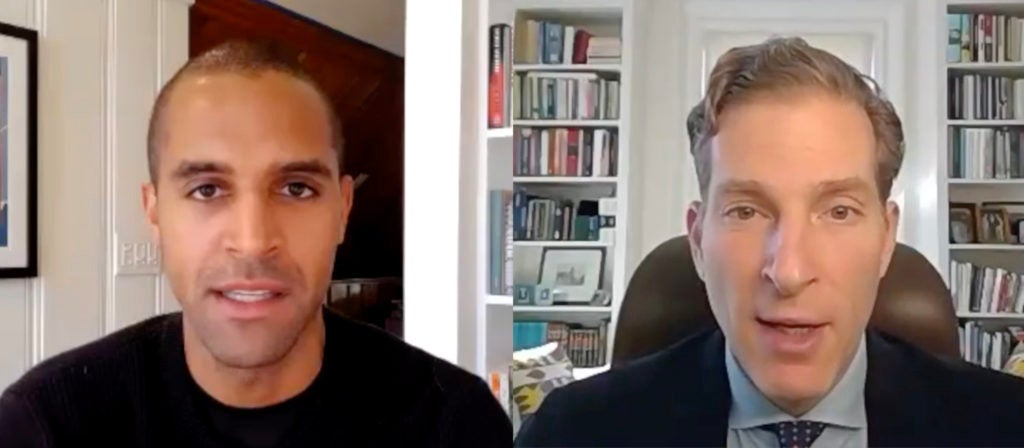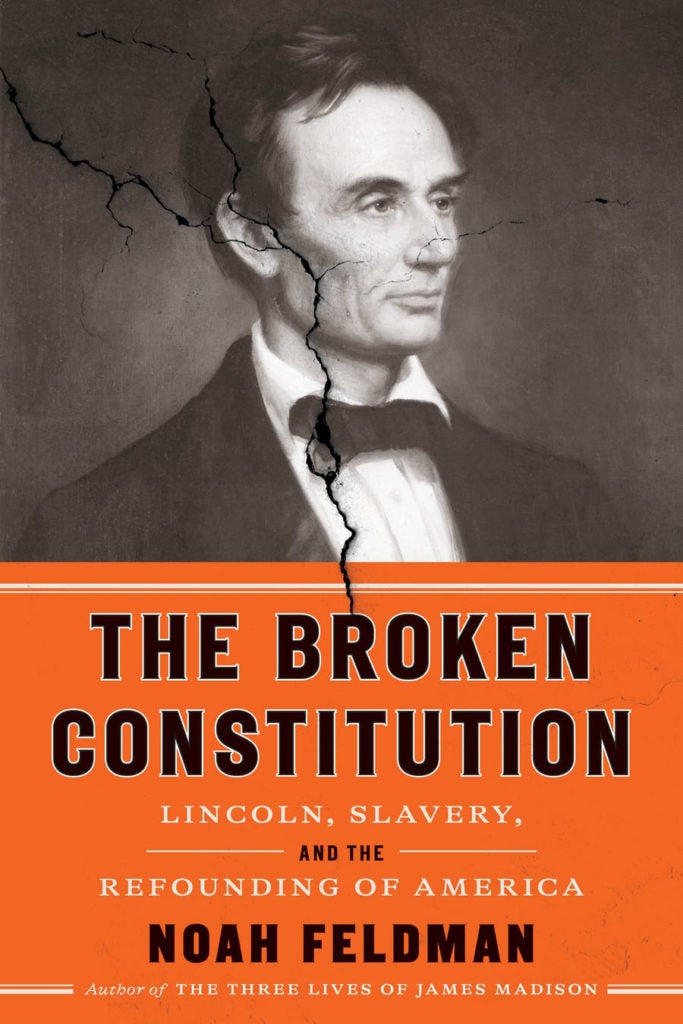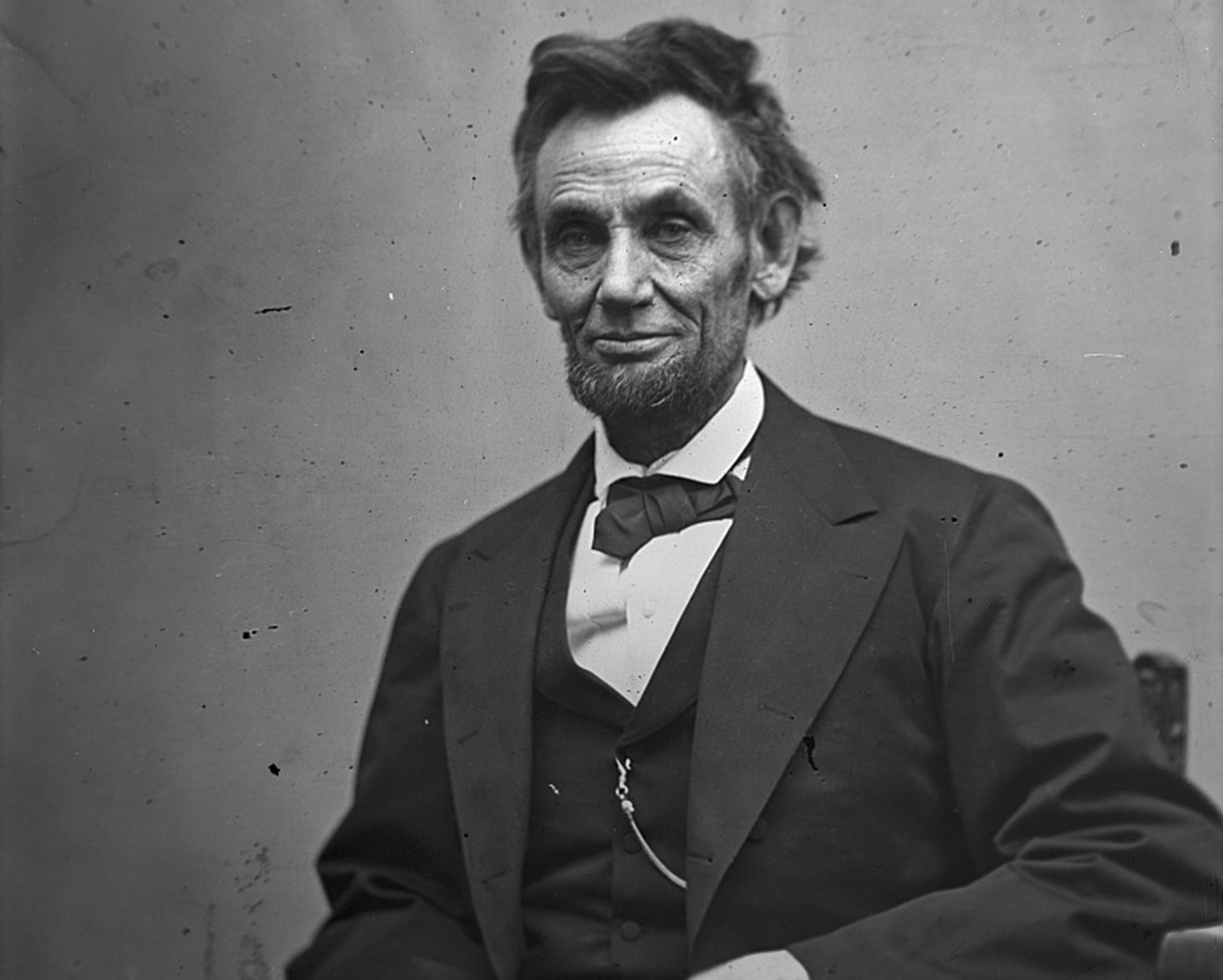Can, or even should, Americans break the U.S. Constitution when, in their view, justice demands it? According to the two panelists at a recent online Harvard Law School Library Book Talk, that question, which President Abraham Lincoln confronted as he fought a war to end slavery, is very much alive today.
In his newly released book, “The Broken Constitution: Lincoln, Slavery, and the Refounding of America,” Harvard Law Professor Noah Feldman argues that the charter, originally drafted in 1787, was repeatedly violated and ultimately remade by America’s 16th president. Winning the Civil War, he says, required an initially reluctant Lincoln to ultimately shred and replace the antiquated agreement, which was fatally infected by its animating compromise to preserve and extend the institution of slavery, a practice even most framers admitted at the time was morally repugnant.
In fact, in his first inaugural address in March 1861, the man history would come to know as the Great Emancipator pledged not to interfere with the institution of slavery, saying: “I believe I have no lawful right to do so, and I have no inclination to do so.” But in less than two years, he had with a stroke of a pen declared free all the enslaved men, women, and children living under Confederate rule.

Along the way, Honest Abe imposed a series of other unprecedented and arguably unconstitutional war measures, including suspending the writ of habeas corpus and jailing thousands of the war’s critics without trial. Through the president’s willingness to infringe the founding document’s constraints against untrammeled government power, and his work to secure passage of the 13th Amendment, Feldman believes Lincoln fashioned a new Constitution, based in justice and divorced from the tainted document he’d inherited.
To Feldman’s colleague, Nikolas Bowie ’14, an assistant professor of law and historian at Harvard, Lincoln’s decision to break with an unjust system of government was not only morally justified, but might also be an example for people today. To illustrate his point, he quoted from W.E.B. Du Bois’ 1935 volume, “Black Reconstruction in America,” about the logic of adhering to outdated and iniquitous laws.
To the extent there’s a conflict between our sense of justice, and what the Constitution demands … why should the Constitution prevail?
Nikolas Bowie ’14
“No more idiotic program could be laid down than to require a people to follow a written rule of government 90 years old, if that rule had been definitely broken in order to preserve the unity of the government and to destroy an economic anachronism,” Du Bois wrote 70 years after Lincoln’s presidency. “In such a crisis, legalists may insist that consistency with precedent is more important than firm and farsighted rebuilding, but manifestly it is not. Rule-following, legal precedents, and political consistency are not more important than right, justice, and plain common sense.”
So, Bowie asked, what does it matter if Lincoln broke the Constitution? Or, as he put it later in the discussion, “to the extent there’s a conflict between our sense of justice, and what the Constitution demands … why should the Constitution prevail?”
While observing the Constitution helps promote some laudable ends, including stability and popular sovereignty, Bowie argued that other values, such as democracy, might be as or more important. “I think breaking the Constitution is potentially troubling,” he said. “But so is being bound by a document that I did not participate in creating.”
In response, Feldman argued in favor of “evolution where possible, and revolution only when necessary.”
“Most of the time, if we think that we’re capable of sustaining a collective sense of agreement, we’re better off evolving the Constitution by interpretation, not saying that we’re breaking it,” said Feldman, a self-professed adherent to the idea of a living Constitution. However, when making progress within the system isn’t possible and, as was the case during the Civil War, and breaking the Constitution becomes “morally obligatory or circumstantially necessary … then you have to do it and pay the price.”
The danger in doing that too often is that it’s an invitation to the Donald Trumps of the world to say, ‘Well, I can break the Constitution. Why not? You know, Abraham Lincoln did it and he was a great president.’
Noah Feldman
But echoing the warning originally attributed to the Greek writer Aesop — that “we would often be sorry if our wishes were granted” — Feldman argued that more radical approaches to securing change can furnish unpredictable and even perilous outcomes.

“The danger in doing that too often is that it’s an invitation to the Donald Trumps of the world to say, ‘Well, I can break the Constitution. Why not? You know, Abraham Lincoln did it and he was a great president,’” he said, noting that he had written the book during the later stages of the Trump presidency. “I was scared about making an argument about Lincoln having broken the Constitution, when the president of the United States was someone who was openly prepared to break the Constitution, not because we had a moral failing, but just because he lost the election.”
“And, so, the cost of saying we’re breaking the Constitution too much is that it weakens the collective sense that we need this relationship to stay together,” Feldman said, acknowledging that which view one takes on this question “may have to do with who has more faith in human nature.”
Citing two presidential wartime measures separated by a century, Bowie countered that, from a narrow legal perspective, Lincoln’s Emancipation Proclamation was little different from President Harry Truman’s decision (later invalidated by the Supreme Court) to seize steel mills to prevent a potentially crippling labor strike during the Korean War. But he argued that the relative moral justifications that drove those decisions couldn’t have been more different.
“It’s actually quite difficult to, as a formal matter, distinguish the Emancipation Proclamation from the seizure of steel,” Bowie said. “I think the far easier distinction is the way in which Lincoln concludes the Emancipation Proclamation, calling it an act of justice. I think today, we can all see that that that is true. It is an act of justice to free enslaved people that is far more normatively valuable than the risk of allowing presidents to seize property going forward whenever they find it necessary.”
And it is through the lens of justice, he argued, that instances of constitutional breakage should be judged. In fact, to ignore justice as the essential factor, he said, “is to set aside what I regard as the most persuasive reason to support something like the Emancipation Proclamation.”
“And, so, it matters why Donald Trump is breaking the Constitution, I think, more than the Constitution must not be broken,” Bowie concluded.
The event was one of a year-long series of talks sponsored by the Harvard Law School Library focusing on new books, many authored by Harvard Law faculty members.
